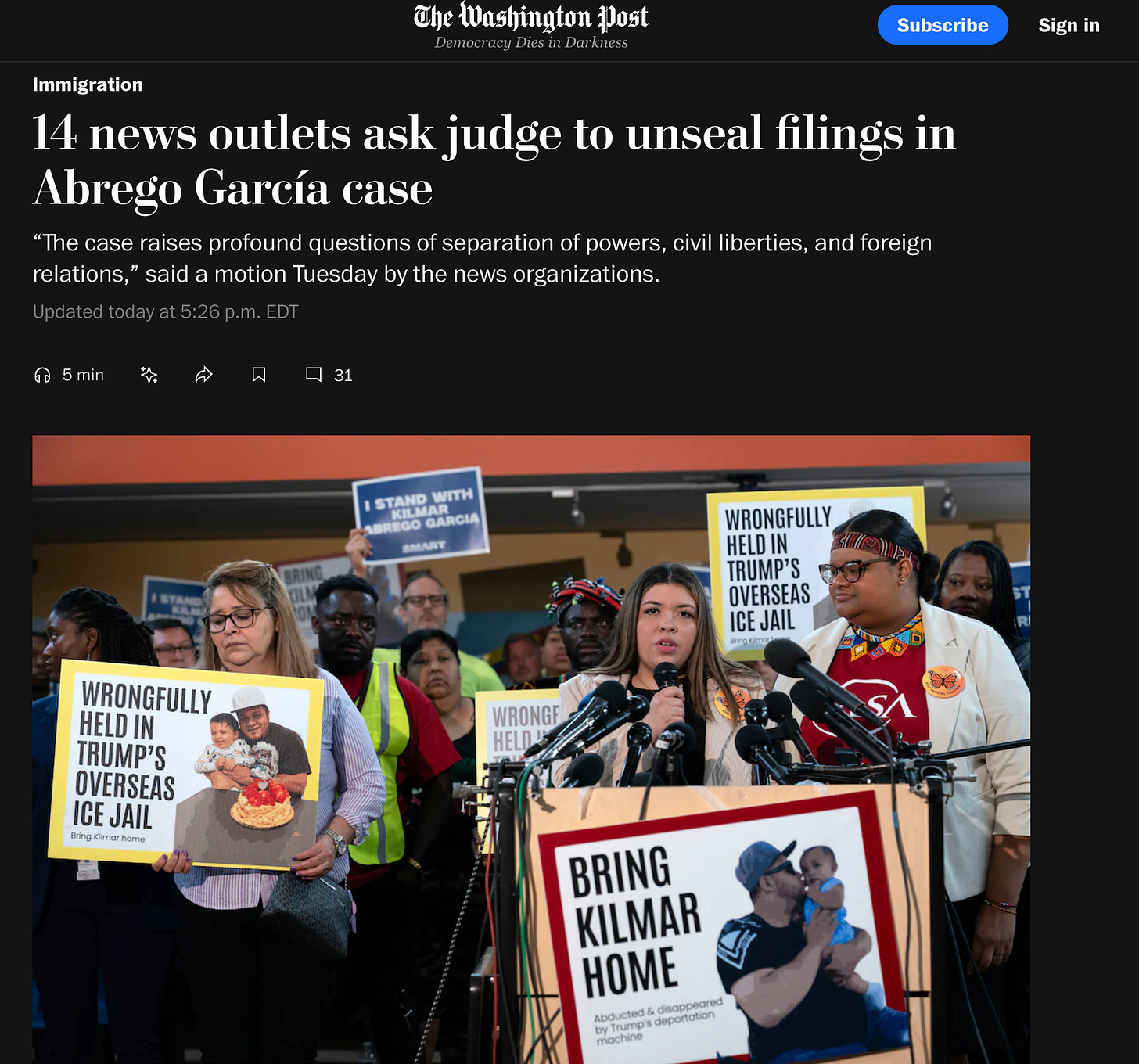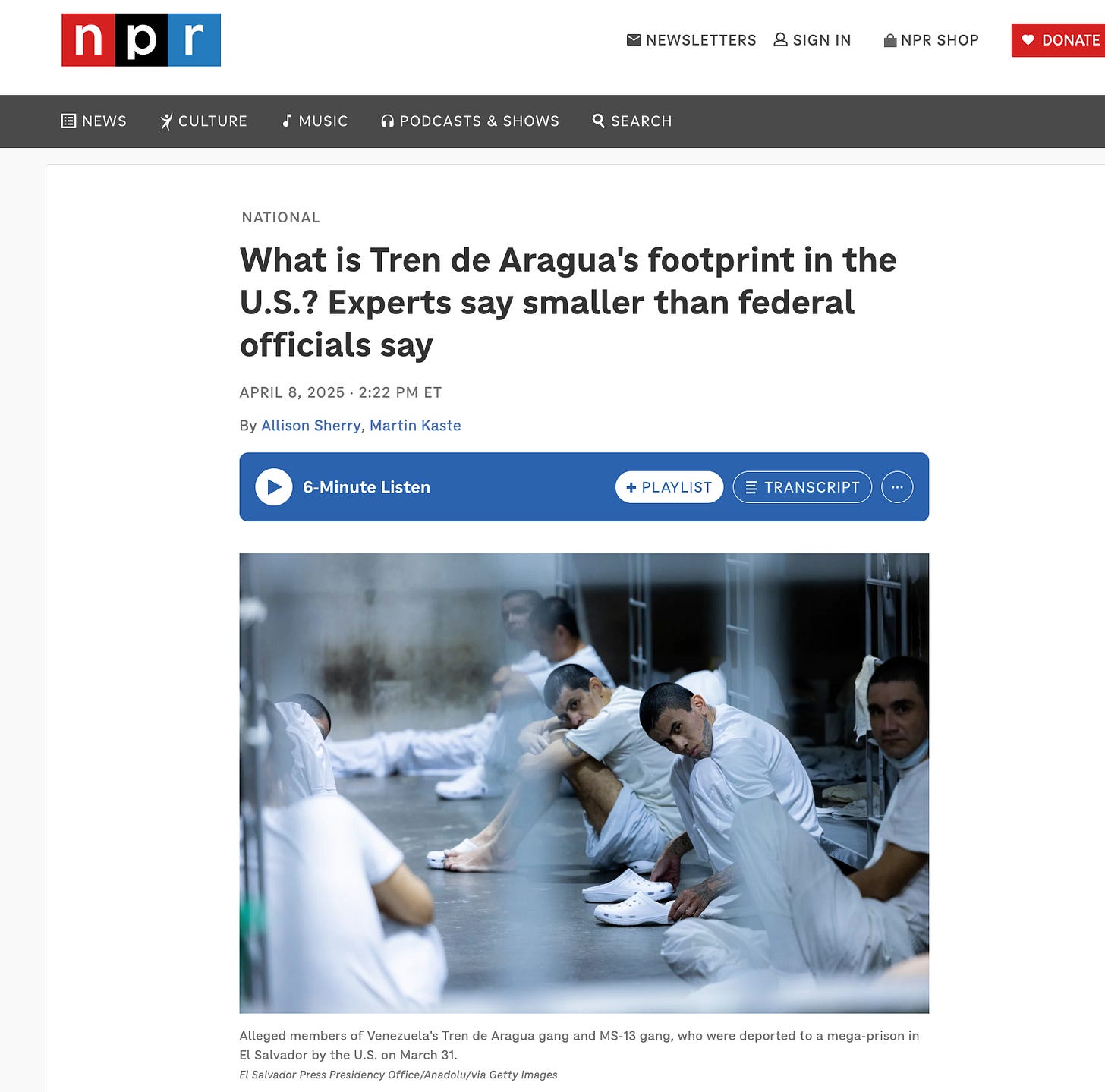“It seems like there are basically no guardrails in any direction.”
Jonathan Blitzer's ongoing pursuit to understand America and the human condition through reporting on immigration during Trump 2.0.
Reflecting on the intense pace of inhumane immigration actions unfolding right now, journalist Jonathan Blitzer offered a candid admission about why his work animates him on a daily basis. “Immigration is everything,” He explained. “It's basically an excuse to concern yourself with the world and the people in it.”
In this second part of our conversation, Blitzer describes how he continues to be surprised by the lengths to which the Trump administration will go in their pursuit of inhumane immigration actions.
ANTERO GARCIA: Are there any kind of guardrails reining in Trump’s policies right now?
JONATHAN BLITZER: I think the one thing that's changed from Trump One to Trump Two, is that in Trump One, as awful as so much of it was, there still were people in positions of influence and importance who could put certain brakes on the most radical policies that Trump and his core group of true believers wanted to set in motion. You ended up seeing horrible things. Take family separation: I thought that was the worst thing I've ever seen in my life. I had never seen anything like it, it's hard for me to imagine ever seeing anything like it again. It was truly devastating. And now it seems almost quaint to think that we were all scandalized about the fact that when a federal judge issued an order instructing the US government to reunite families that had been separated, US government was complying with the order, sure, in a kind of unspirited, lackluster way that was scandalous in its own right, but that they were essentially still feeling like they at least were answerable to a federal judge.
And maybe they were complying in bad faith. Maybe their incompetence meant they didn't have lists that actually accounted for all the families they had separated. Maybe they abdicated their sense of responsibility and let advocacy organizations do the heavy lifting in actually reuniting families, but still they were showing up in a federal court and answering questions put to them by a federal judge. That's not happening now.
I didn't have even a precedent for understanding what it would mean for the government to just not even bother or to openly defy a court, and especially to do it this fast.
AG: And this is happening in the first quarter of the first year of this term.
JB: In retrospect, I think the dynamic I expected was a little bit more following the general pattern of the first term, which is they're going to try X, Y, and Z, and then the courts are going to kind of click into action and there are going to be injunctions and there's going to be a fight and so on. And then out of frustration you're going to start to see defiance. Whereas here, right out of the gate there was defiance.
AG: We are seeing the courts are fighting back in some ways. But thinking about, Kilmar Abrego García, who knew that the constitutional crisis would hinge on a deportation case?
JB: One of the things that I think people have ignored at our collective peril is what has been happing in immigration policy. I think people think immigration policy is cordoned off from so much of the rest of American life because the policy is technical and the people involved aren't US citizens. There's a certain sense of like, ‘Well, okay, it's important maybe, but it's happening over here,” which I think this is a tragedy.
The Trump administration is spoiling for a fight with every institution in our democracy, and the laboratory for them for that fight is always going to be in the immigration space. That's what animates their agenda for one thing, but also it’s politically where they have been most successful.
What scared me going into Trump Two was that I knew that the Democratic opposition to a lot of this immigration policy would be more muted. I think the Democrats drew the wrong lesson from the Biden years. I think they felt like, “Oh, the problem for us is that we just need to be harsher on immigration policy in a way that resembles the Republicans,” which I think is a catastrophic error for moral reasons, policy reasons, and political reasons.
So that also concerned me because look at the difference right now between how forceful the Democratic opposition was to family separation in 2018, and what you're seeing now with the use of Alien Enemies Act or Abrego García. I think [senator] Chris Van Hollen in Maryland deserves a lot of credit for taking this fight on, and maybe it's just a matter of time, maybe the momentum will start to build, but it seems like there are basically no guardrails in any direction.
“The Trump administration and the people who populate it are spoiling for a fight with every institution in our democracy, and the laboratory for them for that fight is always going to be in the immigration space.”
AG: It seems like we’re seeing some wild stretches or uses of archaic law to enact awful policy actions right now.
JB: I was in Denver recently for a story and I had occasion to speak to the mayor and we were talking about the Alien Enemies Act. Obviously, it wasn't lost on me that Trump mentioned the Alien Enemies Act on the campaign trail. And I do think the one lesson that all of us have taken away from the first term is he's going to try to do what he says.
I asked the mayor, “How are you preparing for the start of the Trump administration? Particularly when Trump, as a campaigner talked non-stop about the gang Tren de Aragua in Colorado.” He said to me that basically after Trump won, before inauguration, he started to read up on the Alien Enemies Act. The Alien Enemies Act from 1798 has been used three times in history, always during wartime. And we're not at war. So it's hard to know. You're sitting there on day one as a journalist just trying to parse what was happening. There were a dozen executive orders signed within hours of the inauguration on immigration. I thought it was important to read through those and just try to make sense, try to kind of extract. But it still felt theoretical. What does it mean for an administration to invoke the Alien Enemies Act? I don't know.
Honestly, I'm trying to read up on the period before and during and after the First World War. This is literally the record of this stuff. But it doesn't line up to the present moment. So even if you went into this term bracing for the worst, knowing that all that stuff was coming, it still hits you like a freight train. All of it. There's just no way to organize your mind around the scope of it, or the brazenness of it, or the hatefulness of it.
AG: I think one place where your writing really connects with people is through illuminating these big picture actions through humanistic narratives. I think this is the reason so many people are Everyone Who is Gone is Here, even though it's a doorstop of a book.
JB: Yeah.
AG: So, your reporting on Andry José Hernández Romero. It’s first a story of the small town in Venezuela that his family's from. I think you tell the story in a way where it's not X number of Venezuelans. Instead you tell the story of this individual person and so many other people. I’m curious about your process entering into this work.
JB: I think that there are a lot of different entry points into good immigration reporting. The thing that drives me to it has always been the human element or the people. For me personally, it’s the reason why I find this to be the most important thing in the world and the reason why I'm just obsessed with it from a journalistic standpoint, why I just think it's just so vital. It just feels like I wake up just raring to go to do this.
We're talking right now obviously about a moment of emergency. But immigration writ large is an enormous thing. It's always funny to me in journalistic terms. It's like there are immigration reporters and there are immigration stories, whereas there are also political stories and human interest stories. And to me, immigration is everything. It's basically an excuse to concern yourself with the world and the people in it.
It's a habit of mind more than anything else: a habit of mind of being open to other people's experiences and open to what they can tell you about your own world. And I think for me, one of the biggest driving motivations in all of this has been a repeated experience I've had of learning and understanding things about your own country and community through someone else. I mean like finding yourself in El Salvador, learning things about the United States that you didn't fully know. And imagine an infinite number of applications of that kind of lesson. To me, that lesson has always been a personal one. It's always come through people describing their experiences or showing me something about themselves, their lives, their families.
It’s the opportunity to deal with people, to try to enter their world. The experience of their beginning to trust me, my beginning to learn more about them. And that back-and-forth just means so much to me, honestly. In a way, it's an excuse. The journalism is an excuse to be able to interact with people in this way.
Propina
We will conclude our conversation with Jonathan Blitzer next week. If you haven’t seen his latest article, Blitzer offers an incisive and crucial look at the legal contexts of individuals deported under the Alien Enemies Act:
If you missed the first part of our conversation, you can check it out here:
Journalist Jonathan Blitzer describes trying to cover the onslaught of Trump's immigration policies.
Journalist Jonathan Blitzer’s work offers some of the clearest portraits of how contemporary U.S. immigration policies are reshaping individuals’ lives. His nuanced and humanizing storytelling illuminating otherwise unstated costs of harmful policies. From his groundbreaking book
Lastly, you have one more month to preorder The Cost of Being Undocumented and get some free stickers!
We’ll see you next week.












